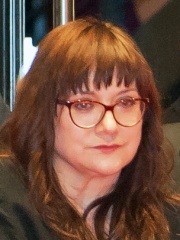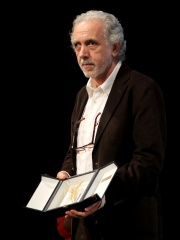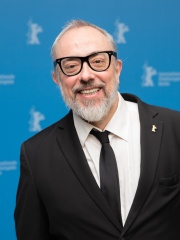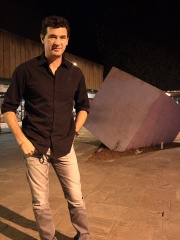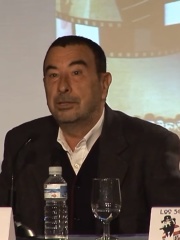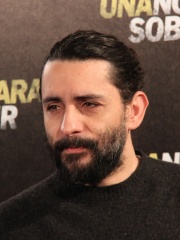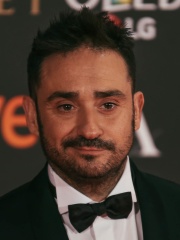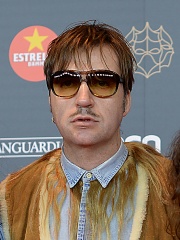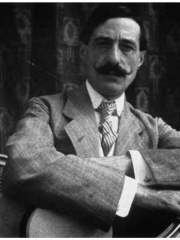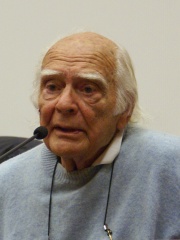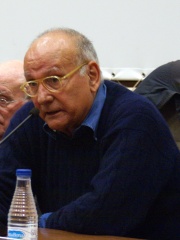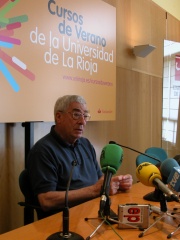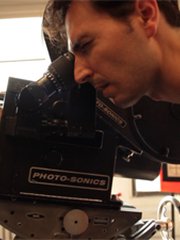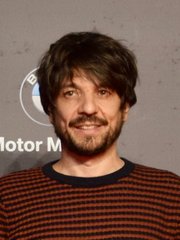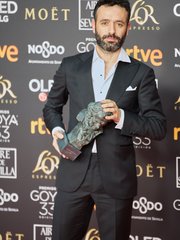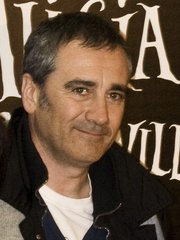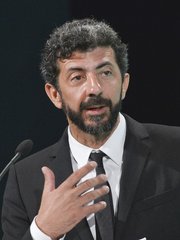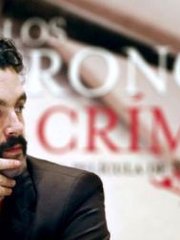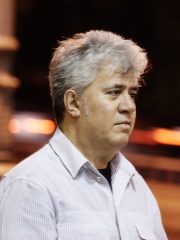
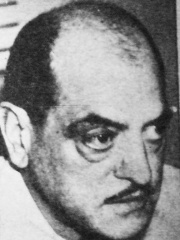
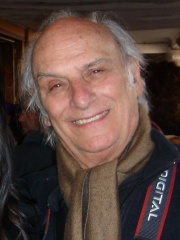
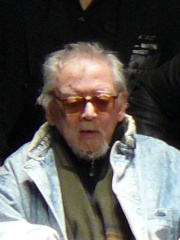
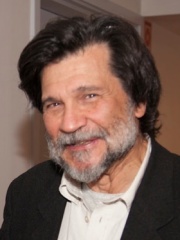
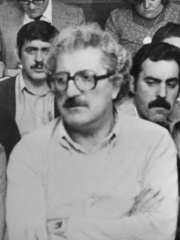
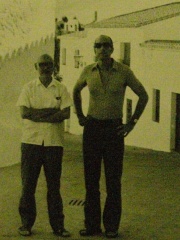
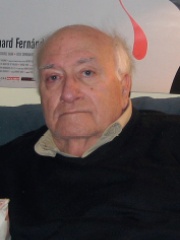
The Most Famous
FILM DIRECTORS from Spain
This page contains a list of the greatest Spanish Film Directors. The pantheon dataset contains 2,041 Film Directors, 52 of which were born in Spain. This makes Spain the birth place of the 9th most number of Film Directors behind Russia, and Japan.
Top 10
The following people are considered by Pantheon to be the top 10 most legendary Spanish Film Directors of all time. This list of famous Spanish Film Directors is sorted by HPI (Historical Popularity Index), a metric that aggregates information on a biography's online popularity. Visit the rankings page to view the entire list of Spanish Film Directors.

1. Pedro Almodóvar (b. 1949)
With an HPI of 78.76, Pedro Almodóvar is the most famous Spanish Film Director. His biography has been translated into 81 different languages on wikipedia.
Pedro Almodóvar Caballero (Spanish: [ˈpeðɾo almoˈðoβaɾ kaβaˈʎeɾo]; born 25 September 1949) is a Spanish film director, screenwriter and author. His films are distinguished by melodrama, irreverent humour, bold colour, glossy décor, quotations from popular culture, and complex narratives. Desire, LGBTQ issues, passion, family, motherhood, and identity are among Almodóvar's most frequently explored subjects. As one of the most internationally successful Spanish filmmakers, Almodóvar and his films have developed a cult following. Almodóvar's career developed during La Movida Madrileña, a cultural renaissance that followed the end of Francoist Spain. His early films characterised the sense of sexual and political freedom of the period. In 1986, he established his own film production company, El Deseo, with his younger brother Agustín Almodóvar, who has been responsible for producing all of his films since Law of Desire (1987). His breakthrough film was Women on the Verge of a Nervous Breakdown (1988), which was nominated for the Academy Award for Best Foreign Language Film. He achieved further success often collaborating with actors Antonio Banderas and Penélope Cruz. He directed Tie Me Up! Tie Me Down! (1989), High Heels (1991), and Live Flesh (1997). Almodóvar's next two films, All About My Mother (1999) and Talk to Her (2002), earned him an Academy Award each, for Best Foreign Language Film and Best Original Screenplay, respectively. His later films Volver (2006), Broken Embraces (2009), The Skin I Live In (2011), Julieta (2016), Pain and Glory (2019), and Parallel Mothers (2021) were also praised. He is also known for directing several short films including The Human Voice (2020) and Strange Way of Life (2023). He made his first English-language feature film with The Room Next Door (2024), which won the Golden Lion at the 81st Venice International Film Festival. Almodóvar has received numerous accolades, including an Academy Award, two Golden Globe Awards, two Emmy Awards, five BAFTA Awards, and five Goya Awards. He received the French Legion of Honour in 1997, the Gold Medal of Merit in the Fine Arts in 1999, the European Film Academy Achievement in World Cinema Award in 2013, and the Golden Lion for Lifetime Achievement in 2019. He has also received honorary doctoral degrees from Harvard University, in 2009 and from the University of Oxford in 2016.

2. Luis Buñuel (1900 - 1983)
With an HPI of 78.28, Luis Buñuel is the 2nd most famous Spanish Film Director. His biography has been translated into 72 different languages.
Luis Buñuel Portolés (Spanish: [ˈlwis βuˈɲwel poɾtoˈles]; 22 February 1900 – 29 July 1983) was a Spanish and Mexican filmmaker who worked in France, Mexico, and Spain. He has been widely considered by many film critics, historians, and directors to be one of the greatest and most influential filmmakers of all time. Buñuel's works are known for their avant-garde surrealism which was also infused with political commentary. Often associated with the surrealist movement of the 1920s, Buñuel's career spanned the 1920s through the 1970s. He collaborated with prolific surrealist painter Salvador Dalí on Un Chien Andalou (1929) and L'Age d'Or (1930). Both films are considered masterpieces of surrealist cinema. From 1947 to 1960, he honed his skills as a director in Mexico, making grounded and human melodramas such as Gran Casino (1947), Los Olvidados (1950), and Él (1953). Here is where he gained the fundamentals of storytelling. Buñuel then transitioned into making artful, unconventional, surrealistic, and political satirical films. He earned acclaim with the morally complex arthouse drama film Viridiana (1961) which criticized the Francoist dictatorship. The film won the Palme d'Or at the 1961 Cannes Film Festival. He then criticized political and social conditions in The Exterminating Angel (1962) and The Discreet Charm of the Bourgeoisie (1972), the latter of which won the Academy Award for Best Foreign Language Film. He also directed Diary of a Chambermaid (1964) and Belle de Jour (1967). His final film, That Obscure Object of Desire (1977), earned the National Society of Film Critics Award for Best Director. Buñuel earned five Cannes Film Festival prizes, two Berlin International Film Festival prizes, a BAFTA Award, and an Academy Award in 1972. Buñuel received numerous honors including National Prize for Arts and Sciences for Fine Arts in 1977, the Moscow International Film Festival Contribution to Cinema Prize in 1979, and the Career Golden Lion in 1982. He was nominated twice for the Nobel Prize in Literature, in 1968 and then in 1972. Seven of Buñuel's films are included in Sight & Sound's 2012 critics' poll of the top 250 films of all time. Buñuel's obituary in The New York Times called him "an iconoclast, moralist, and revolutionary who was a leader of avant-garde surrealism in his youth and a dominant international movie director half a century later."

3. Carlos Saura (1932 - 2023)
With an HPI of 71.07, Carlos Saura is the 3rd most famous Spanish Film Director. His biography has been translated into 53 different languages.
Carlos Saura Atarés (4 January 1932 – 10 February 2023) was a Spanish film director, photographer and writer. With Luis Buñuel and Pedro Almodóvar, he is considered to be among Spain's great filmmakers. He had a long and prolific career that spanned over half a century, and his films won many international awards. Saura began his career in 1955 making documentary shorts. He gained international prominence when his first feature-length film premiered at Cannes Film Festival in 1960. Although he started filming as a neorealist, Saura switched to films encoded with metaphors and symbolism in order to get around the Spanish censors. In 1966, he was thrust into the international spotlight when his film The Hunt won the Silver Bear at the Berlin International Film Festival. In the following years, he forged an international reputation for his cinematic treatment of emotional and spiritual responses to repressive political conditions. By the 1970s, Saura was the best known filmmaker working in Spain. His films employed complex narrative devices and were frequently controversial. He won Special Jury Awards for Cousin Angelica (1973) and Cría Cuervos (1975) in Cannes, and he received an Academy Award for Best Foreign Language Film nomination in 1979 for Mama Turns 100. In the 1980s, Saura was in the spotlight for his Flamenco trilogy – Blood Wedding, Carmen and El amor brujo, in which he combined dramatic content and flamenco dance forms. His work continued to be featured in worldwide competitions and earned numerous awards. He received two nominations for Academy Awards for Best Foreign Language Film for Carmen (1983) and Tango (1998). His films are sophisticated expression of time and space fusing reality with fantasy, past with present, and memory with hallucination. In the last two decades of the 20th century, Saura concentrated on works uniting music, dance and images.

4. Jesús Franco (1930 - 2013)
With an HPI of 69.46, Jesús Franco is the 4th most famous Spanish Film Director. His biography has been translated into 35 different languages.
Jesús Franco Manera (12 May 1930 – 2 April 2013), also commonly known as Jess Franco, was a Spanish filmmaker, composer, and actor, known as a highly prolific director of low-budget exploitation and B-movies. He worked in many different genres during his career, but was best known for his horror and erotic films, often incorporating surrealist elements. In a career spanning from 1954 to 2013, he wrote, directed, produced, acted in, and scored approximately 173 feature films, working both in his native Spain and (during the rule of Francisco Franco) in France, West Germany, Switzerland, Portugal and Italy. Additionally, during the 1960s, he made several films in Brazil and Istanbul. Franco's films are known for distinctive visual style and idiosyncratic approach to filmmaking, often directing multiple films concurrently. Despite mixed critical reception during his lifetime, Franco's work has gained a dedicated cult following, and he is regarded as a significant figure in the history of exploitation cinema. In 2009, he received an Honorary Goya Award from the Academy of Cinematographic Arts and Sciences of Spain for his contributions to Spanish cinema.
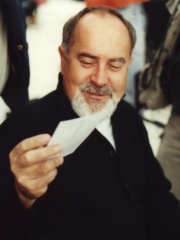
5. Bigas Luna (1946 - 2013)
With an HPI of 65.40, Bigas Luna is the 5th most famous Spanish Film Director. His biography has been translated into 33 different languages.
José Juan Bigas Luna (19 March 1946 – 5 April 2013) was a Spanish film director, designer and artist. His films are typically characterised by a strong emphasis on the erotic, often related to food, something for which he admitted a strong passion. His work often explores and parodies clichés of Spanish identity, but he had an international career and made films in Spanish, Catalan, Italian, French and English.

6. Víctor Erice (b. 1940)
With an HPI of 63.93, Víctor Erice is the 6th most famous Spanish Film Director. His biography has been translated into 25 different languages.
Víctor Erice Aras (Spanish: [ˈbiɣtoɾ eˈɾiθe]; born 30 June 1940) is a Spanish film director. He is best known for his first two feature fiction films, The Spirit of the Beehive (1973), which many regard as one of the greatest Spanish films ever made, and El Sur (1983).

7. Juan Antonio Bardem (1922 - 2002)
With an HPI of 63.60, Juan Antonio Bardem is the 7th most famous Spanish Film Director. His biography has been translated into 28 different languages.
Juan Antonio Bardem Muñoz (2 June 1922 – 30 October 2002) was a Spanish film director and screenwriter, born in Madrid. Bardem was best known for Muerte de un ciclista (1955) which won the FIPRESCI Prize at the 1955 Cannes Film Festival, and El puente (1977) which won the Golden Prize at the 10th Moscow International Film Festival. His 1979 film Seven Days in January won the Golden Prize at the 11th Moscow International Film Festival. In 1953, he and Luis García Berlanga founded a film magazine, Objetivo, which existed until 1956. He was a member of the Communist Party. During the Franco dictatorship, Bardem was imprisoned by the Spanish State due to the anti-fascist nature of his films. In 1981, he was a member of the jury at the 12th Moscow International Film Festival. In 1993, he was a member of the jury at the 43rd Berlin International Film Festival. Bardem was the father of director Miguel Bardem and uncle of actor Javier Bardem. Bardem died in Madrid in 2002, at age 80.

8. Néstor Almendros (1930 - 1992)
With an HPI of 62.40, Néstor Almendros is the 8th most famous Spanish Film Director. His biography has been translated into 27 different languages.
Néstor Almendros Cuyás, ASC (30 October 1930 – 4 March 1992) was a Spanish cinematographer. He was one of the most highly appraised contemporary cinematographers, having a working collaboration with filmmakers François Truffaut, Éric Rohmer and Robert Benton, while winning an Oscar for Best Cinematography for Terrence Malick's Days of Heaven.

9. Vicente Aranda (1926 - 2015)
With an HPI of 61.44, Vicente Aranda is the 9th most famous Spanish Film Director. His biography has been translated into 24 different languages.
Vicente Aranda Ezquerra (Spanish: [biˈθente aˈɾanda eθˈkera]; 9 November 1926 – 26 May 2015) was a Spanish film director, screenwriter and producer. Due to his refined and personal style, he was one of the most renowned Spanish filmmakers. He started as a founding member of the Barcelona School of Film and became known for bringing contemporary Spanish novels to life on the big screen. Aranda was also noted for exploring difficult social issues and variations on the theme of desire while using the codes of melodrama. Love as uncontrollable passion, eroticism and cruelty are constant themes in his filmography. The frank examination of sexuality is one of the trademarks of his work, as seen in his most internationally successful film: Amantes (1990) (Lovers).
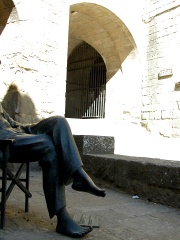
10. Luis García Berlanga (1921 - 2010)
With an HPI of 61.03, Luis García Berlanga is the 10th most famous Spanish Film Director. His biography has been translated into 29 different languages.
Luis García-Berlanga Martí MMT (12 June 1921 – 13 November 2010) was a Spanish film director and screenwriter. Acclaimed as a pioneer of modern Spanish cinema, his films are marked by social satire and acerbic critiques of Spanish culture under the Francoist dictatorship. These include Welcome Mr. Marshall! (1953), which won the International Prize (Comedy Film) at the 1953 Cannes Film Festival, Plácido (1961), nominated for an Academy Award for Best Foreign Language Film in 1962, and The Executioner (1963), winner of the FIPRESCI Prize at the 24th Venice International Film Festival He kept a long-time collaboration with screenwriter Rafael Azcona, with whom he co-wrote the scripts for seven of his films between 1961 and 1987.
People
Pantheon has 52 people classified as Spanish film directors born between 1871 and 1986. Of these 52, 34 (65.38%) of them are still alive today. The most famous living Spanish film directors include Pedro Almodóvar, Víctor Erice, and Isabel Coixet. The most famous deceased Spanish film directors include Luis Buñuel, Carlos Saura, and Jesús Franco. As of April 2024, 9 new Spanish film directors have been added to Pantheon including Artur Balder, Oriol Paulo, and Rodrigo Sorogoyen.
Living Spanish Film Directors
Go to all RankingsPedro Almodóvar
1949 - Present
HPI: 78.76
Víctor Erice
1940 - Present
HPI: 63.93
Isabel Coixet
1960 - Present
HPI: 58.07
Fernando Trueba
1955 - Present
HPI: 57.33
Álex de la Iglesia
1965 - Present
HPI: 56.17
Julio Medem
1958 - Present
HPI: 55.25
José Luis Garci
1944 - Present
HPI: 54.90
Jaume Collet-Serra
1974 - Present
HPI: 54.43
Jaume Balagueró
1968 - Present
HPI: 53.97
J. A. Bayona
1975 - Present
HPI: 53.89
Javier Aguirresarobe
1948 - Present
HPI: 53.16
Albert Serra
1975 - Present
HPI: 52.44
Deceased Spanish Film Directors
Go to all RankingsLuis Buñuel
1900 - 1983
HPI: 78.28
Carlos Saura
1932 - 2023
HPI: 71.07
Jesús Franco
1930 - 2013
HPI: 69.46
Bigas Luna
1946 - 2013
HPI: 65.40
Juan Antonio Bardem
1922 - 2002
HPI: 63.60
Néstor Almendros
1930 - 1992
HPI: 62.40
Vicente Aranda
1926 - 2015
HPI: 61.44
Luis García Berlanga
1921 - 2010
HPI: 61.03
Segundo de Chomón
1871 - 1929
HPI: 59.65
Antonio Isasi-Isasmendi
1927 - 2017
HPI: 57.66
Mario Camus
1935 - 2021
HPI: 56.02
Rafael Azcona
1926 - 2008
HPI: 54.50
Newly Added Spanish Film Directors (2025)
Go to all RankingsArtur Balder
1974 - Present
HPI: 51.89
Oriol Paulo
1975 - Present
HPI: 48.40
Rodrigo Sorogoyen
1981 - Present
HPI: 47.16
Javier Fesser
1964 - Present
HPI: 46.80
Jorge Guerricaechevarría
1965 - Present
HPI: 46.46
Alberto Rodríguez Librero
1971 - Present
HPI: 45.48
Nacho Vigalondo
1977 - Present
HPI: 44.95
Paco Plaza
1973 - Present
HPI: 44.53
Daniel Sánchez Arévalo
1970 - Present
HPI: 41.53
Overlapping Lives
Which Film Directors were alive at the same time? This visualization shows the lifespans of the 18 most globally memorable Film Directors since 1700.

